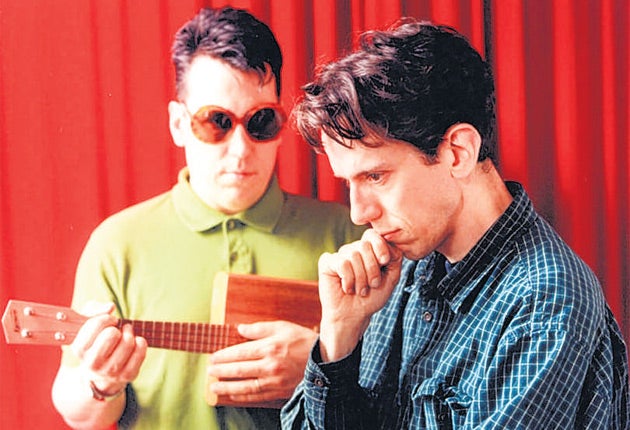Why do bands make albums for children?
Moulding a three-year-old's musical taste is utterly impossible, says Fiona Sturges

Your support helps us to tell the story
From reproductive rights to climate change to Big Tech, The Independent is on the ground when the story is developing. Whether it's investigating the financials of Elon Musk's pro-Trump PAC or producing our latest documentary, 'The A Word', which shines a light on the American women fighting for reproductive rights, we know how important it is to parse out the facts from the messaging.
At such a critical moment in US history, we need reporters on the ground. Your donation allows us to keep sending journalists to speak to both sides of the story.
The Independent is trusted by Americans across the entire political spectrum. And unlike many other quality news outlets, we choose not to lock Americans out of our reporting and analysis with paywalls. We believe quality journalism should be available to everyone, paid for by those who can afford it.
Your support makes all the difference.Imagine you are a successful singer-songwriter. You have just had your first child. You are, like any new parent, in awe of your new offspring, bowled over by their every twitch. You fret quietly about their future and wonder what they will be like when they are older. Will they be scientific or arty? Introvert or extrovert? Reliable or rebellious? But perhaps the most critical question of all, the one upon which all your hopes and dreams are pinned, is this: what kind of music will they like?
It is, you suspect, this anxiety among musicians – that their children will reject their discerning musical tastes and revel in a migraine-inducing fondness for Aqua's "Barbie Girl" – that leads them to make a kids' album. We are not talking here about collections of punk-rock nursery rhymes – although these do exist. No, these are original and often serious-minded songs aimed at pre-schoolers in an attempt to refine their undeveloped musical sensibilities and prise them off the rusty hull of novelty pop.
Indie bands are the main culprits in this rarefied genre. Saint Etienne, purveyors of conceptual, Sixties-inspired pop, did it five years ago with Up the Wooden Hills, an EP about animals and the letters of the alphabet. Tindersticks, famed for songs about the darker side of life, and the sensitive Scots Belle & Sebastian have curated albums of children's songs. The latter's Colours Are Brighter featured original compositions by Franz Ferdinand, The Kooks and Snow Patrol.
Then there is the American alt-rock duo They Might Be Giants, who seem to have cornered the market in kids' albums and children's TV soundtracks. Their first children's album, No!, was released in 2002. They followed up with Here Come The ABCs and Here Come The 123s. Now they are about to release yet another album for kids, Here Comes the Science. This is an undeniably pleasant, guitar-based LP that endeavours to educate children in the basics of physics, biology and chemistry, featuring lyrics such as: "Iron is a metal you see it every day/ Oxygen eventually will make it rust away."
I put the album to the test by playing it to my three-year-old daughter. In her short life Lily has been exposed to a wide variety of music, from the Glee soundtrack to Nick Cave to Grizzly Bear – most of which she has politely ignored. Her listening habits adhere to a one rule: if it's disco, she'll dance to it. The first song on Here Comes Science prompted a bout of theatrical swaying – after which she walked around in circles until she fell over. After that she busied herself trying to stuff a toy penguin into her shoe. Clearly, she wasn't listening. Further attempts to engage her fell flat.
We all love to imagine that our offspring are sophisticated, cultured and discerning individuals who, given the chance, would choose artfully composed pop music over mass-produced pap. In most cases, however, they will go for the pap. Trying to mould children's musical tastes at such a young age seems to me an arrogant, not to say futile exercise.
There will almost certainly come a time, when Lily is older, when I will attempt to indoctrinate her with the life-altering genius of The Smiths, along with my other musical obsessions – efforts which I expect to be ignored or rebutted. This is because there will always be a gulf between what we want our children to like and what they will actually like. It is called the generation gap, and it is exactly how it should be.
Join our commenting forum
Join thought-provoking conversations, follow other Independent readers and see their replies
Comments